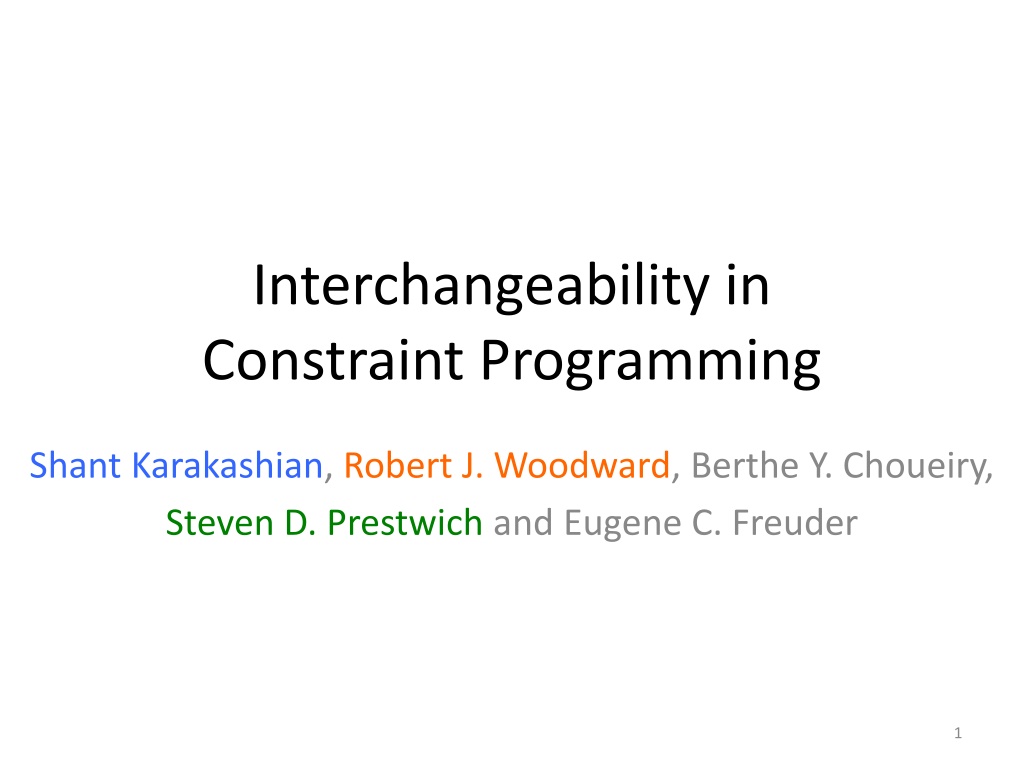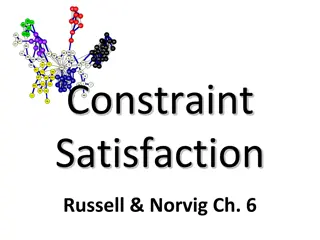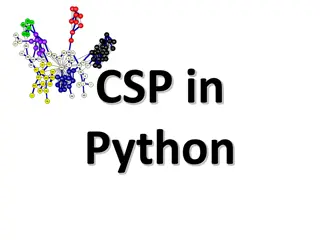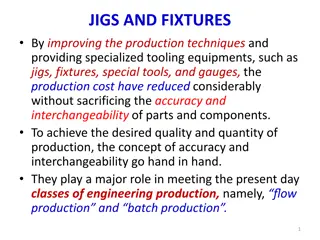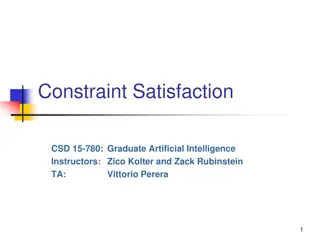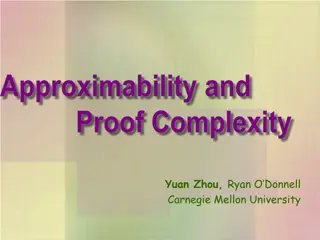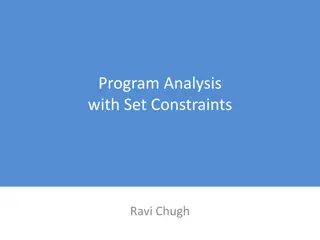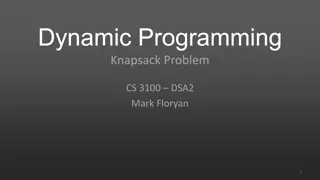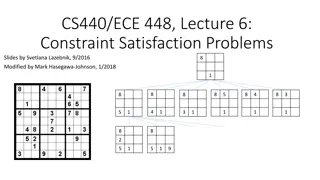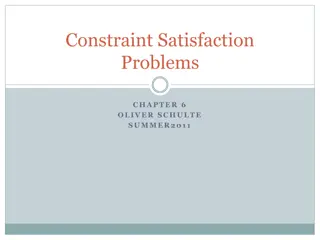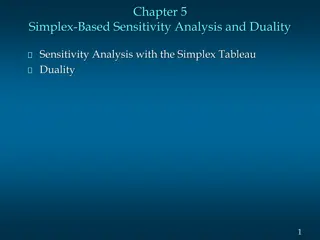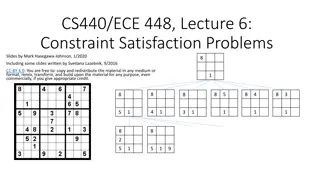Understanding Interchangeability in Constraint Programming
Explore the concept of interchangeability in constraint programming as proposed by Freuder in 1991. Learn about full interchangeability, neighborhood interchangeability, subproblem interchangeability, and partial interchangeability. Discover how these symmetries can be detected and utilized in solving constraint satisfaction problems.
Download Presentation

Please find below an Image/Link to download the presentation.
The content on the website is provided AS IS for your information and personal use only. It may not be sold, licensed, or shared on other websites without obtaining consent from the author. Download presentation by click this link. If you encounter any issues during the download, it is possible that the publisher has removed the file from their server.
E N D
Presentation Transcript
Interchangeability in Constraint Programming Shant Karakashian, Robert J. Woodward, Berthe Y. Choueiry, Steven D. Prestwich and Eugene C. Freuder 1
Outline Interchangeability: Basics Robert Full, Neighborhood, Subproblem, Partial, Substitutability Global versus Local, Strong versus Weak Survey Beyond [Freuder 91]: Subsequent definitions Beyond simple CSPs: Quantified, Soft, Distributed CSPs Relationships of Properties Shant AND/OR graphs, SLDD, OBDD, FDynSub SAT Steve 2
Basics of Interchangeability Interchangeability proposed by Freuder in 1991 One of the first forms of symmetry detection for CSPs Symmetry is not specified, but is detected Forms orginally defined Full Interchangeability (FI) Local Neighborhood Interchangeability (NI) k-Interchangeability (KI) Extended: Weak Subproblem Interchangeability (SPrI) Partial Interchangeability (PI) Substitutability (Sub) Extended: Other Meta-interchangeability (MI) Functional interchangeability FI Subproblem global KI NI local Subproblem 3
Full Interchangeability (FI) A value a for variable v is fully interchangeable with value b iff every solution in which v=a remains a solution when b is substituted for a and vice-versa. V3 f g Solutions V2 v V2 V3 V4 V4 c d e h i a d g h b d g h v 4
Neighborhood Interchangeability (NI) A value a for variable v is neighborhood interchangeable with value b iff for every constraint on v, the values compatible with v=a are exactly those compatible with v=b. c d e f g a is compatible with: c, e, f b is compatible with: c, e, f 5
Subproblem Interchangeability (SPrI) Two values are subproblem interchangeable, with respect to a subset of variables S, iff they are fully interchangeable with regards to the solutions of the subproblem of the CSP induced by S. V2 V3 d c e f Solutions to S V1 V3 a e b e V1 6
Partial Interchangeability (PI) Two values are partially interchangeable with respect to a subset S of variables, iff any solution involving one implies a solution involving the other with possibly different values for variables in S. V3 e f Solutions V1 V2 V3 V4 V2 V4 a c e g c d g h b d e g V1 7
Substitutable (Sub) For two values a and b for variable v, a is substitutable for b iff every solution in which v=b remains a solution when b is replaced by a but not necessarily vice-versa V2 V3 Solutions c d e f g v V2 V3 a c g a d f b d f v 8
Overview Basics of Interchangeability Full Interchangeability Neighborhood Interchangeability Subproblem interchangeability Partial Interchangeability Substitutable Summer Survey Project Quantified CSPs Soft CSPs Distributed CSPs Relationships of Properties SAT 9
Subsequent Definitions (chronological) Neighborhood Partial Interchangeability (NPI) Directional Interchangeability (DirI) Directional Substitutability (DirSub) Neighborhood Interchangeability Relative to a Constraint (NIC) Neighborhood Substitutability Relative to a Constraint (NSubC) [Boussemart et al., 2004] Dynamic Neighborhood Interchangeability (DynNI) Full Dynamic Interchangeability (FDynI) Conditional Interchangeability (ConI) Neighborhood Tuple Interchangeability (NTI) Forward Neighborhood Interchangeability (ForwNI) Tuple Substitutability (TupSub) Full Dynamic Substitutability (FDynSub) Context Dependent Interchangeability (CtxDepI) Generalized Neighborhood Substitutability (GNSub) [Choueiry and Noubir, 1998] [Naanaa, 2007] [Naanaa, 2007] [Haselbock, 1993] [Beckwith and Choueiry, 2001] [Prestwich, 2004a] [Zhang and Freuder, 2004] [Neagu and Faltings, 1999] [Wilson, 2005] [Jeavons et al., 1994] [Prestwich, 2004b] [Weigel et al., 1996] [Chmeiss and Sais, 2003] 10
Beyond Simple CSPs (order with presentation) Quantified CSPs Soft CSPs Distributed CSPs Other forms of symmetry AND/OR trees Interchangeability in particular classes of problems Solution Robustness SAT The list goes on 11
Quantified CSPs (QCSPs) Informally, it is a constraint satisfaction problem where variables can be either universally ( ) or existentially quantified ( ) For the problem to be satisfiable, every value in the domain of a universally quantified variable needs to have a support in the remaining existentially quantified variables One huge improvement to QCSP solvers is bundling NI values for universally quantified variables 12 [Gent et al., 2005; 2008]
Quantified CSPs (QCSPs) In QCSPs, variables are either universally ( ) or existentially quantified ( ) One huge improvement to QCSP solvers is bundling NI values for universally quantified variables 13 [Gent et al., 2005; 2008]
Soft CSPs Soft CSPs do not have a precise definition of consistency Defined for Interchangeability/substitutability, Global/local forms Two types: and Interchangeability: degradation When assignments are interchangeable up to a degradation level Interchangeability: threshold When assignments are interchangeable within a threshold 14 [Bistarelli et al., 2003]
Distributed CSPs A CSP where variables, domains, and constraints are distributed over a set of autonomous agents Original assumption was that each agent was given one variable, if not, could: Compilation: new variable is defined whose domain is the set of solutions to the original local problem Decomposition: each agent creates virtual agents for each variable in its local problem and simulates the activities for the virtual agents Though these two techniques do not scale well Can combat compilation with interchangeability 15 [Burke and Brown, 2006]
Overview Basics of Interchangeability Full Interchangeability Neighborhood Interchangeability Subproblem interchangeability Partial Interchangeability Substitutable Summer Survey Project Quantified CSPs Soft CSPs Distributed CSPs Relationships of Properties SAT 16
